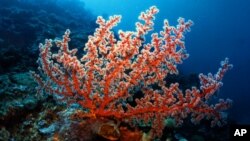BONN, GERMANY —
Global warming is causing trillions of dollars of damage to coral reefs, aggravating the risks to tropical small island states as sea levels rise, according to a United Nations report released Thursday.
Sea levels off some western Pacific islands rose by four times the global average, with annual gains of 1.2 cms (0.5 inch) from 1993 to 2012, according to the U.N.’s Environment Program.
Release of the study, "Emerging Issues for Small Island Developmeng States, was timed to mark the U.N.'s World Environment Day on June 5. It came during U.N. climate change talks taking place June 4-15 in this western German city.
Warming waters from the Indian Ocean to the Caribbean are damaging reefs by killing the tiny animals whose stony skeletons form them, the report said.
A toll on atolls
"These 52 nations, home to over 62 million people, emit less than 1 percent of global greenhouse gasses, yet they suffer disproportionately from the climate change that global emissions cause," said Achim Steiner, head of UNEP.
"Some islands could become uninhabitable and others are faced with the potential loss of their entire territories," the study said.
Loss of coral takes a costly economic toll, the report said. Coral reefs help protect coasts from storms, serve as nurseries for many types of fish and also attract tourists.
In Grenada, fishermen are reporting fewer and smaller "catches in areas where there once was a thriving trade," said Roland Bhola, the country's environment minister, who is participating in the talks.
"We have been able to associate that with the issues of climate change ... the destruction of our coral reefs and other ecosystems like mangroves,” he said.
Threatened ecosystems
A study last month estimated that each hectare (2.5 acres) of the world's coral reefs provided services worth $350,000 a year.
"Corals .. are probably the most threatened ecosystems on the planet," Robert Costanza, of the Australian National University and lead author of the study, told Reuters.
Some people on small islands are considering moving inland because rising sea levels are causing erosion and bringing more salt onto farmland, said Jacqueline McGlade, chief scientist of UNEP.
"But many of them don't have places to retreat towards," she said.
Greenhouse gases blamed
The U.N. panel of climate scientists in March said it is at least 95 percent probable that human emissions of greenhouse gases are the main cause of a rise in average world temperatures.
"Addressing climate change ... is absolutely vital to the survival of small island states," Christiana Figueres, executive secretary of the U.N.’s Framework Convention on Climate Change, said at a news conference.
The report said small islands could shift to abundant solar and wind power to help cut fuel import bills, which are often between 5 and 20 percent of gross domestic product.
“We are doing what we can,” said Marshall Islands Environment Minister Tony de Brum, citing plans to invest in solar energy. His nation also has the world's largest shark sanctuary as part of efforts to protect nature, he added.
Sea levels off some western Pacific islands rose by four times the global average, with annual gains of 1.2 cms (0.5 inch) from 1993 to 2012, according to the U.N.’s Environment Program.
Release of the study, "Emerging Issues for Small Island Developmeng States, was timed to mark the U.N.'s World Environment Day on June 5. It came during U.N. climate change talks taking place June 4-15 in this western German city.
Warming waters from the Indian Ocean to the Caribbean are damaging reefs by killing the tiny animals whose stony skeletons form them, the report said.
A toll on atolls
"These 52 nations, home to over 62 million people, emit less than 1 percent of global greenhouse gasses, yet they suffer disproportionately from the climate change that global emissions cause," said Achim Steiner, head of UNEP.
"Some islands could become uninhabitable and others are faced with the potential loss of their entire territories," the study said.
Loss of coral takes a costly economic toll, the report said. Coral reefs help protect coasts from storms, serve as nurseries for many types of fish and also attract tourists.
In Grenada, fishermen are reporting fewer and smaller "catches in areas where there once was a thriving trade," said Roland Bhola, the country's environment minister, who is participating in the talks.
"We have been able to associate that with the issues of climate change ... the destruction of our coral reefs and other ecosystems like mangroves,” he said.
Threatened ecosystems
A study last month estimated that each hectare (2.5 acres) of the world's coral reefs provided services worth $350,000 a year.
"Corals .. are probably the most threatened ecosystems on the planet," Robert Costanza, of the Australian National University and lead author of the study, told Reuters.
Some people on small islands are considering moving inland because rising sea levels are causing erosion and bringing more salt onto farmland, said Jacqueline McGlade, chief scientist of UNEP.
"But many of them don't have places to retreat towards," she said.
Greenhouse gases blamed
The U.N. panel of climate scientists in March said it is at least 95 percent probable that human emissions of greenhouse gases are the main cause of a rise in average world temperatures.
"Addressing climate change ... is absolutely vital to the survival of small island states," Christiana Figueres, executive secretary of the U.N.’s Framework Convention on Climate Change, said at a news conference.
The report said small islands could shift to abundant solar and wind power to help cut fuel import bills, which are often between 5 and 20 percent of gross domestic product.
“We are doing what we can,” said Marshall Islands Environment Minister Tony de Brum, citing plans to invest in solar energy. His nation also has the world's largest shark sanctuary as part of efforts to protect nature, he added.










